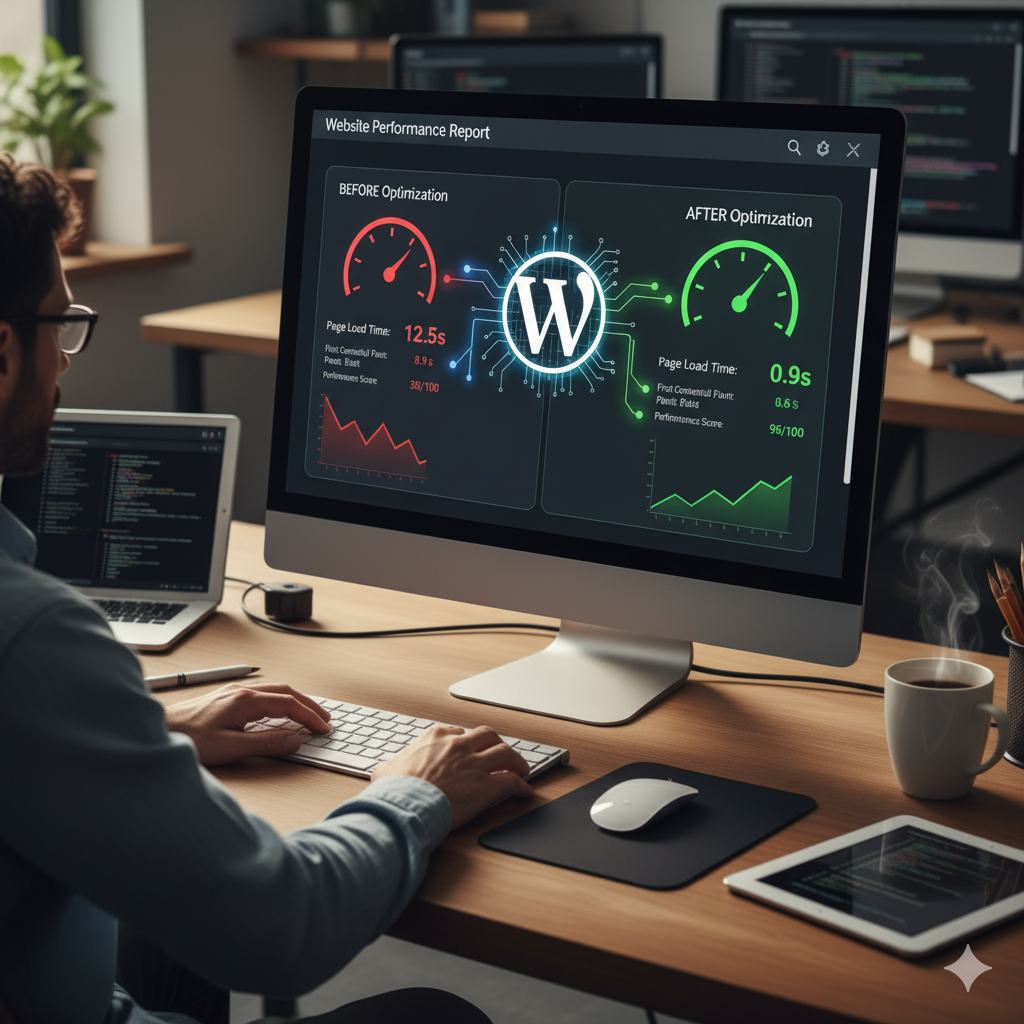Introduction
Website speed directly affects everything — SEO rankings, user engagement, and conversion rates. A slow WordPress website can lose visitors in seconds, no matter how good the design or content is.
That’s why WordPress performance optimization is one of the most important services I provide.
It involves analyzing your entire environment — theme, plugins, database, and hosting — to ensure your website runs as efficiently as possible.
If your project also involves creating a custom theme or a custom plugin, you can check my other related articles here:
➡️ Custom WordPress Theme Development: From Design to Fully Functional Website
➡️ Custom WordPress Plugin Development: Turning Unique Ideas into Powerful Tools
And if you’re moving from one hosting provider to another, I’ve also detailed how I handle safe and complete migrations:
➡️ WordPress Migration Services: Move Your Website Safely Between Any Hosting Platform
Why WordPress Performance Optimization Matters
Performance optimization is not just about numbers on a speed test — it’s about the real experience users have when navigating your website.
A well-optimized site:
- Loads quickly even under heavy traffic.
- Improves SEO by reducing bounce rates.
- Uses fewer server resources.
- Enhances security by keeping everything updated and efficient.
- Offers a smoother experience on all devices.
These are key elements that affect both visitors and search engines.
How I Optimize WordPress Performance
Performance depends on multiple factors — hosting, code quality, images, caching, and database efficiency.
Here’s a step-by-step look at my process:
1. Initial Performance Audit
I start with a detailed audit using tools like Google PageSpeed Insights, GTmetrix, and server logs to identify what’s slowing down the website.
This includes:
- Theme and plugin performance.
- Render-blocking scripts or large assets.
- Database queries.
- Server configuration and caching layers.
2. Hosting and Server Review
If needed, I help clients move to better environments, such as Kinsta, WP Engine, Hostinger, or Cloudways, where WordPress can fully perform at its best.
(Related reading: WordPress Migration Services)
3. Code and Theme Optimization
I clean and optimize code to:
- Remove unused CSS/JS files.
- Minimize requests.
- Implement lazy loading and responsive image sizes.
- Adjust Gutenberg block output for performance.
Custom themes and plugins I develop are lightweight by design, following modern WordPress standards.
4. Caching and CDN Setup
I configure caching plugins such as WP Rocket, W3 Total Cache, or LiteSpeed Cache, depending on the hosting setup.
I also integrate Content Delivery Networks (CDNs) like Cloudflare or Bunny.net for faster global delivery.
5. Database and Query Optimization
- Cleanup of post revisions, transients, and unused tables.
- Optimization of queries in custom plugins.
- Regular database maintenance tasks.
6. Image and Media Optimization
I use compression and WebP conversion to reduce media size without losing quality, often integrating with plugins like ShortPixel or Smush.
7. Continuous Monitoring
Performance isn’t a one-time fix — I implement monitoring tools to track uptime, response times, and server load continuously.
Contact Me
Looking for a reliable WordPress expert to manage your projects, optimize performance, or create custom solutions?
Let’s make your websites faster, safer, and fully functional — get in touch today!
Plugins and Tools I Use
Depending on the project’s setup, I may use:
- Query Monitor for debugging.
- PageSpeed Insights for score optimization.
- WP Rocket for caching and minification.
- Perfmatters for script control.
- New Relic or Kinsta APM for advanced performance tracking.
These tools help identify real bottlenecks and fine-tune every aspect of the site.
Optimization Results

In recent projects, optimization led to:
- Up to 80% faster page load times.
- Improved Core Web Vitals scores.
- Reduced server load by up to 50%.
- Increased conversions and user retention.
Integrations and Advanced Configurations
When needed, I integrate performance techniques with other functionalities:
- Optimized API integrations (e.g., HubSpot, Kit.com, Google APIs).
- Efficient custom Gutenberg blocks without unnecessary JavaScript.
- Server-side caching and preloading for high-traffic websites.
These optimizations keep the site both fast and flexible.
Maintenance and Long-Term Results
I offer ongoing maintenance plans to:
- Keep WordPress core, themes, and plugins updated.
- Monitor uptime and performance reports.
- Apply security and caching updates regularly.
The goal is not only to make your site fast today but to keep it fast and stable over time.
Conclusion
Website performance is at the heart of every successful WordPress project.
Whether you need a speed boost, a full optimization audit, or a long-term maintenance strategy, I can help make your site faster, safer, and more search-friendly.
If your website also needs a custom theme, custom plugin, or a migration to a new host, explore my other articles below:
WordPress Migration Services: Move Your Website Safely Between Any Hosting Platform
Custom WordPress Theme Development: From Design to Fully Functional Website
Custom WordPress Plugin Development: Turning Unique Ideas into Powerful Tools
